#YES. WE NEARLY ALL THOUGHT THAT MARCILLE HAD TO DIE.
Text
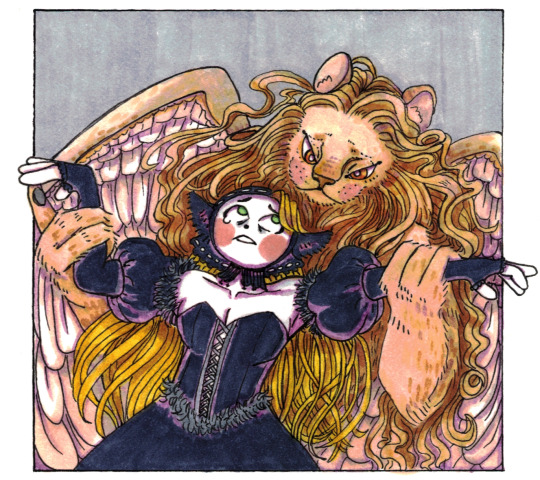
Danse Macabre
[Commission]
#dungeon meshi#dungeon meshi spoilers#marcille donato#winged lion#better drawn mdzs#<- art tag I really need to change.#Turns out the secret to drawing better was having someone offer you money to draw.#I jest. I just had a blast with this prompt and I seriously appreciate the commissioner for letting me have the chance to push myself.#And for giving me permission to post! Hi! If you're seeing this: thank you again!#Let me be clear: no I don't quite know where this came from. It just happened. My chakras unblocked for a few hours.#You too can unblock my chakras with money and commission me to draw cool art B*)#We are so far off from when this is relevant so this one is really just for the manga readers. *****Spoiler notes ahead:#So...As someone who read dungeon meshi monthly for many years....I admit to not seeing Marcille becoming the dungeon lord coming#Hilarious too; re-reading and watching the show made me realize that this outcome is pretty strongly foreshadowed.#Ryoko Kui distracts you by putting the focus on Laios being the 'one to break the curse' but nope!#This was the culmination of her goals and desires.#And - for those who did not have to suffer as us monthly readers did:#YES. WE NEARLY ALL THOUGHT THAT MARCILLE HAD TO DIE.#The last 20 or so chapters were a constant spiral of: 'Oh this story isn't going to have a happy ending is it?'#She just keeps losing herself! The winged lion plays her like a puppet and she is his perfect doll! So full of conviction!
631 notes
·
View notes
Text
@nnayomaise mentioned you on a post “i don't think enough people understand that, as a...”:
@fallloverfic i think he had to be suicidal before his dungeon, (not as much as he is in the current story ofc) but purely because he chose to become a dungeon lord knowing that it would eat all of his desires and he would wither away and die- and for him having a place to go, he could very easily have left his dungeon and gone back to the canaries (yes they would've killed him but they likely would've just revived him) which would be the right thing to do, he knows this
(continued): "he knows the process of how they remove dungeon lords, he knows this is how canaries literally save the world from the dungeons, he probably thought a lot about backing out and essentially returning to reality but the goat manipulated him into staying then ate his desire to return"
I don't personally think anything about his decision to go with and stay with the mirror/goat indicates he was suicidal at that point, and you kind of disprove this yourself by indicating the goat - an outside force - was manipulating him into his decision(s). To each their own headcanon, obviously, and I like crunchy background for Mithrun, but here's at least why I don't think we have canon evidence for Mithrun being suicidal before he was abandoned by the demon.

In Bonus: Miscellaneous Monster Tales -6-, we learn just how dangerous magic mirrors are:

The manga notes this is specifically a moment of weakness, to an object specifically designed to steal his heart. Sometimes we all get caught on bad days. This was one of Mithrun's (he made the mistake of not ignoring the mirror). He was strong back then, but he wasn't invincible.
As the Adventurer's Bible notes about the Central Watchtower (his dungeon), "Since it hadn't had a lord for a long time, it was believed to be nearly collapsed. Mithrun was dispatched to investigate a nearby rash of disappearances and got taken in." (133). This was relatively routine/not a big deal, but it got him in a chance moment. The goat struck while the iron was hot. As the Adventurer's Bible explains, "Once, while under the impression that his older brother had stolen his beloved, Mithrun wished for a life where he hadn't joined the canaries. As a result, he fell under the spell of a demon" (74). This is framed largely as an accident/bad luck: we can't all be vigilant forever, after all. He even comments about these things to Kabru earlier, "You wished for those things... . . . You wished, so the dungeon provided. . . . Don't wish often." (p.157, Chapter 61: Roasted Walking Mushroom, Volume 9). Even casual wishes can have major consequences, and that desire attracts the demon (e.g., when Marcille is trying to get control, the demon acts on her subconscious desires for protection, and the only solution they have is to trap it in a book):
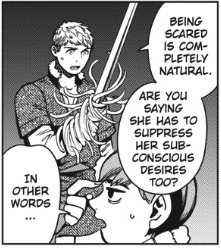
A moment of weakness against resolve to continue can perhaps imply he had depression he wasn't addressing, and was likely desperate and missing things he'd sacrificed, and was vulnerable to manipulation, but none of that really indicates specifically that he was suicidal. Knowing a bad thing could happen to you - even perhaps a form of death - when performing your job doesn't necessarily make you suicidal, though it might make you a bit reckless and/or foolhardy. Firefighters are not, by definition, suicidal. And there's really no evidence that Mithrun was in his right mind when he made his wish/went with the demon. As we see with Sissel, Marcille, and Laios, the demon is a master manipulator who knows how to overwhelm its targets, where even casual things you don't actively think about can lead to your undoing.
"and for him having a place to go, he could very easily have left his dungeon and gone back to the canaries (yes they would've killed him but they likely would've just revived him) which would be the right thing to do, he knows this"
How easy would it have been for him to leave? We can see what it took to get Sissel and Marcille to leave (Sissel ultimately fell to the demon, Marcille was a special case that involved large groups of people working together to find alternate solutions), and even what the demon used to keep Laios from enacting his plan when Laios becomes lord of the dungeon (chapter 88 is really great for showing just how skilled a manipulator the demon is; and even with fail-safes, Laios + Co couldn't get around this). And it's clearly indicated from at least Kabru's perception of Mithrun's backstory that Mithrun worked hard to stop anyone from coming in to get him while he was dungeon lord. It's easy to, academically, know how to solve a problem. It's another to make it work in the field. The only reason anyone was able to drag him out was seemingly because the demon "hadn't eaten enough to build up sufficient power" and "vanished" (p.185, chapter 62: Six Days, Volume 9). Mithrun had no apparent desire to leave, and was actively working to stay, likely in part because he was under the demon's spell. He even notes in the Complete Adventurer's Guide that the demon's love is compelling to the point of mental collapse. His knowing, logically, that leaving would have saved him, did nothing for him, because a lot was working against him, including powerful magic and his own human weakness for things he could have if he stayed. And him choosing to stay, despite likely somewhere in his head knowing what would happen if he didn't leave, again doesn't make him suicidal. I doubt he was thinking of the consequences all that much: he was too focused on the fantasy the demon made for him. When you're in the middle of a high, you typically aren't thinking of the comedown.
There's also another reason he probably wasn't thinking about it, that we see with Laios (and Marcille, and even I think with Sissel): a lot of us always think we'll be the one to get one over. We think we're smart enough or strong enough to succeed where others fail. Only Laios managed to succeed in part because his plan was so ridiculous and the demon's own overconfidence got in its way. In the Adventurer's Bible, Mithrun notes that before the dungeon, he "looked down on everyone." (76). He was arrogant. I imagine that part of why he probably wouldn't have given up had he thought about his potential fate was that he thought he'd succeed in surviving. His story is very much one of hubris (e.g., his thinking for why the demon took away his eye and ear ends). In the Adventurer's Bible, we see his confidence when he approaches Milsiril to talk to her (86), and we see how he is in combat. He was confident, and self-avowedly arrogant. That's a dangerous mix.
There is some vagueness for how other dungeon lords who weren't Mithrun, Marcille, Sissel, and Laios got out of their situations: we know there are a number, because we see them in the Complete Adventurer's Bible during the group chat scene set up by Pattadol. If it's explained somewhere how they were rescued/removed, and if for some reason Mithrun knew that could be him, too, but he chose not to for specific suicidal reasons, I have no idea. cartchytuns in the notes noted that they were probably freed when Laios got rid of the demon at the end of the story, since the demon in every dungeon was all the same demon, and I think that makes a lot of sense! If this is what happened, that means even fewer dungeon lords left the dungeon of their own volition/abilities, and that decreases the likelihood that Mithrun was able to, and increases the validity that he just actively chose not to.
Mithrun was jealous, angry, arrogant, and had seemingly some form of imposter's syndrome, possibly due to being an illegitimate son when his legitimate brother was someone he viewed as inferior, but his supposed superiority didn't save him from getting sent to the Canaries, which he is bitter about. He perhaps sometimes wished at least somewhat for things he didn't and perhaps couldn't have. As he notes in the Adventurer's Bible, "And instead of [his brother], my parents sent me to the Canaries. I couldn't forgive any of that." (76). He was also good at hiding/masking all of this and pretending to be light-hearted/have no problems and "perfect" (in Milsiril's words). He was very clearly deeply unhappy and hiding it. His already being suicidal is a neat headcanon! And good luck with it/any fics! The fun part of the story's ambiguity is how much we don't know and how fanworks can fill in those gaps! But as of this moment, I really don't see canon evidence for him being suicidal before he was abandoned by the demon.
#nnayomaise#fallfthoughts#mithrun#delicious in dungeon#suicidality#depression#mental health problems#delicious in dungeon manga spoilers#dunmeshi manga spoilers#dungeon meshi manga spoilers#suicide mention
13 notes
·
View notes
Text
Reading Dungeon Meshi, Chapter 3: Roast Basilisk

Intro
Welcome back to my re-read-through of Dungeon Meshi (aka Delicious in Dungeon) by Ryoko Kui, the freshest flavor of seinen fantasy you’ll find on the market today. For an introduction to the cast and the story so far, check out my entries for Chapter 1 and Chapter 2.
In this installment, Marcille has a bad dream, Laius practices his mad chicken impression, and Senshi uses his battleaxe for a roasting spit.
Synopsis
Marcille wakes from a horrible dream in which her mother has served her a table laden with the noxious fruits of a dungeon harvest. Emerging from her Catapult Nightmare with the requisite bolt-upright shriek, she smells something mouthwatering, and spies a nearby party breaking their fast on grilled salt pork and bread. Senshi is indignant. The typical adventurers’ diet of dried meat, bread, and wine is decidedly unbalanced. Even a party with “enough to eat” can still be undone by malnutrition. Speaking of which, their own recent diet has lacked a vital nutrient: fat! It’s time to go monster hunting, and the monster du jour is basilisk.
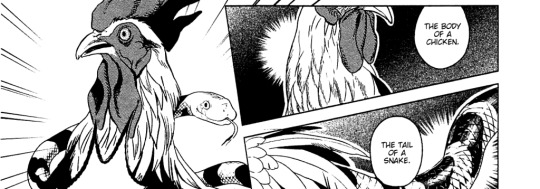
Called “the king of snakes” the basilisk is a cross between a rooster and a snake, a two-beast combination which Laius admires for its balance and simplicity. Hunting down the nest, the party discovers a handful of newly laid eggs, an excellent source of fat that should complement their chicken dinner nicely. (Eggs? Since when does a rooster lay eggs? But they look like snake eggs, not chicken eggs, so…best not overthink it…) No sooner have they wrapped up the eggs than a scream from nearby alerts them to the basilisk’s presence, as the monster gives chase to the party they saw earlier.
Laius immediately leaps into action – not by drawing his sword, but by spreading his arms and legs and letting out a mighty BAAAWK, doing his best to intimidate the foe and give the other party a chance to escape. (Marcille and Chilchuk agree to pretend they don’t know him.) While Laius has the basilisk distracted, Senshi comes round behind the monster, and he and Laius rush in at the same time. The two heads of the beast are momentarily paralyzed with confusion as it tries to deal with both threats at once, and in that moment the dwarf and fighter strike, and the basilisk is down.
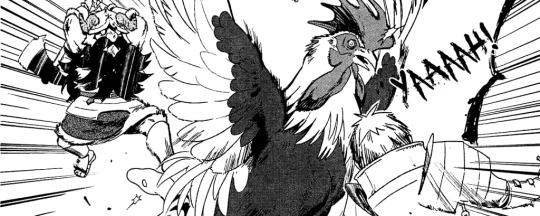
A member of the other party had taken a hit from the basilisk’s venomous spur, and he’s not looking well. Fortunately, Senshi can concoct an antidote from the beast’s blood…if he can be persuaded to! The poor fellow might be on death’s door, but the dwarf insists that antidotal herbs taste better when cooked, and it’s a wee bit early for lunch. Only after everyone engages in some grand performative theater about how hungry they are does Senshi agree to grace them with…roast basilisk!
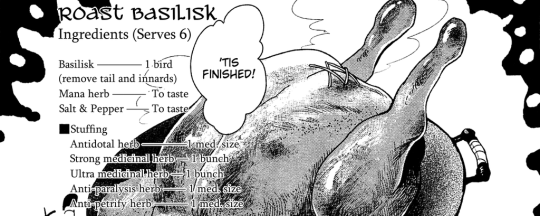
Stomachs are filled, the wounded are healed, Senshi doles out some life advice about nutrition and exercise, and the other party part ways with our heroes encouraged and invigorated – only to get wiped out by man-eating plants a few days later.
Thoughts
In this chapter we go beyond the hunting and the cooking of the dungeon’s denizens and consider the nutrition problem. Not only do you have to kill the things (without getting yourself killed), prepare them in such a way that they are rendered both palatable and digestible, and preserve the dungeon ecosystem; you also have to get the right variety in your diet, lest you suffer malnutrition. Such attention to detail is one of the major selling points of the series, and shows off the mangaka’s enthusiasm for expanding on her central premise. I almost wonder if Laius is at least partly an author surrogate, his wide-eyed (wild-eyed?) ardor for monster anatomy acting as an outlet for her own absorption in the subject. I usually don’t like using a story to psychoanalyze its author, but in this case I’ve got to imagine that Ryoko Kui truly enjoys setting up and solving all these little puzzles. I love how caring she seems, always having Senshi mother everyone and dole out good advice. You can just see her lying awake at night worrying about her characters – are they getting enough to eat, do they have a balanced diet, are they exercising, are they sleeping right?
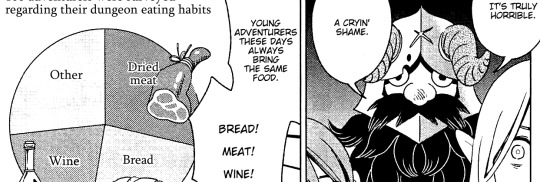
Oh yes, and are they playing well with the other adventurers? Yet another example of attention to detail is the regular inclusion of other adventuring parties. A less thoughtful (or more minimalist) author might have used the survive-in-the-dungeon scenario to downplay the social aspects of the story, isolating the heroes in a narrow tunnel of monster encounters and survival challenges. In Dungeon Meshi, no matter how deeply the party delves, they’re always encountering other wanderers in the dungeon, several of whom are gradually woven into the larger plot. Now, some mangaka multiply characters when they’re running out of ideas (I’m looking at you, Tite Kubo), or keep the story going with a succession of villains-of-the-week (I’m looking at you, Rumiko Takahashi). Thankfully (thus far) this series has been guilty of neither. Whether they come and go in the course of a chapter (like the unfortunates in this installment), or come to play a bigger role in the story (like others we’ll meet later on), every new introduction feels thoughtfully crafted, planned and designed to enrich the story and bring something fresh out of the main characters and the setting. After all, this wouldn’t be nearly so fun if we didn’t get regular opportunities for our heroes to impress other people with their weirdness.
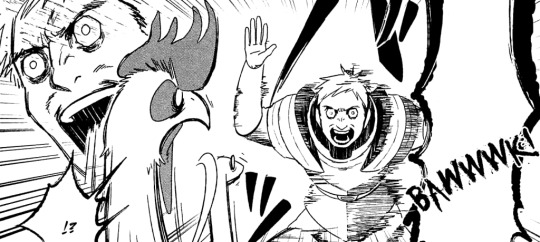
One particular bit of Laius-weirdness that comes out in full force in this chapter is his total lack of vanity, an indispensable virtue when survival demands methods that are not always dignified. Performing an enraged chicken impression might not be what most warriors sign up for when they get into the business, but the willingness to adopt unorthodox tactics can often spell the difference between victory and defeat. Flexibility in the face of new challenges, openness to strange experiences, readiness to throw oneself heart and soul into the task at hand, no matter how bizarre or inelegant – these are the traits required of a man when madness is on the menu. And the secret ingredient to all these virtues is the one great virtue of humility. Not mere self-abnegation, but true self-forgetfulness, a state of pure focus possible only to those who have completely given themselves up to something beyond themselves. Laius has doubly given himself up – on the one hand to the quest, to the rescue of his sister – on the other to his vision of integrating organically into the food chain of the dungeon. Any man with a vision, a quest, a vocation, a high calling, must be ready to do the same.
Finally…well…good advice can’t save everybody. Even with renewed hope and the best intentions, there will always be the would-be heroes who die obscure deaths far from home. Never forget that the protagonists are often just the lucky ones. Never forget to be grateful.
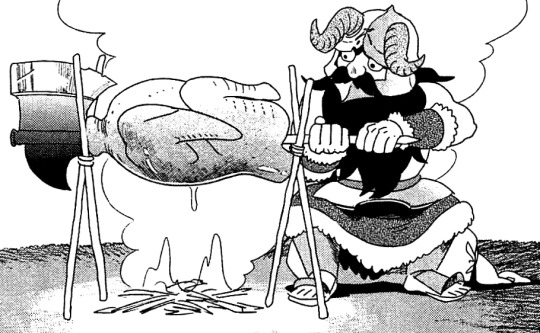
Volume three of Dungeon Meshi is available for purchase on Amazon.
6 notes
·
View notes